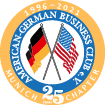Date/Time
Date(s) - 25/09/2019
6:30 pm - 10:00 pm
Location
Marriott Hotel
Categories
Speaker: Michael Lenski, IKEA Deutschland GmbH & Co. KG, Store Manager Niederlassung Eching
Quotation on IKEA – IKEA Founder Ingvar Kamprad: “The word ‘impossible’ has been and must remain deleted for our dictionary.”
IKEA is a well-known brand all over the world. What makes IKEA different from other companies and why is IKEA linked with Sweden … and Sweden similarly with IKEA?
Please join us to learn more about IKEA and the special relationship between Swedish culture and the Company’s culture. And to learn how IKEA integrates its Swedish origin into its global commercial successes.
Starting with its Vision to create a better everyday life for many people, IKEA has built a strong business idea: to offer a wide range of home furnishings with attractive design and functionality at prices so low that as many people as possible are able to afford them.
A key component of IKEA’s corporate identity and branding is its Swedish origin. The stores can be recognized all over the world by the blue-yellow appearance and the Swedish flags. In the furniture store, all employees wear blue and yellow uniforms, huge wall photos show Swedish landscapes, and the products have Swedish, Scandinavian or at least Swedish-sounding names. In addition, with special marketing programs, IKEA and its Customers celebrate typical Swedish festivals and traditions like Midsommar, Julboard or crayfish festival.
Starting from the idea of a social welfare state, Sweden has a strong tradition of taking care of citizens. IKEA has integrated this concept into the company culture, one that features its IKEA Key Values, its IWAY guidelines for Suppliers, and its employee standards.
A central feature of its culture is its sustainability strategy – IKEA People & Planet Positive – which was launched in 2012 with ambitious goals to transform the IKEA business as well as industries in the IKEA value chain plus life-at-home for people all across the world. Designed to stimulate future action across the IKEA ecosystem, this sustainability strategy is an agenda for everyone in the IKEA franchise system and its value chain with targets and commitments set for 2030 in line with the UN’s plan for Sustainable Development.
In achieving this strategy, IKEA’s is committed to become a circular business, one that focuses on avoiding waste while regenerating and recycling materials. Among the key elements are:
- Design 100% of its products according to its circular design principles by 2030.
- Use of only renewable or recycled materials in making its products by 2030.
- Develop new ways to Customers to acquire, use, care for and then pass on their products for further use.
- Take the lead and work together with others to promote a circular economy.
In addition, among the key features of IKEA’s commercial strategy are effective corporate messaging and its steps to benefit from today’s evolving shift to more online purchasing world (e.g. with smaller in-town stores).
Dipl. Kfm. Michael Lenski commenced his work at IKEA 25 years ago after completing his studies at the University of Cologne. Starting in the HR department at IKEA Cologne, he next helped open new Stores as HR Manager in Freiburg and Ulm. After 10 years in HR, he became Store Manager at IKEA Regensburg, and then at IKEA Munich-Brunnthal. For the past three years he has been responsible for around 400 co-workers at IKEA Eching, the oldest IKEA store in Germany. In addition to his job as Store Manager, he worked on various national and international IKEA projects and as Coach in the international IKEA Store Manager Program.
IKEA Background – Found in 1943, IKEA founder Ingvar Kamprad started selling furniture made by local manufacturers. By 1955, manufacturers began boycotting IKEA, protesting against Kamprad’s low prices and compelling him to design home furnishings in-house. He soon developed his revolutionary innovation, the flat pack – simple-to-assemble, attractive, and affordable furniture, packaged in a flat-pack and sold in-house. The driving idea behind IKEA was, and is, that anyone should be able to afford stylish, modernist furniture.
IKEA’s business grew. And grew, expanding first throughout Sweden, next into Norway and Denmark, then via Switzerland (1973) into continental Europe (e.g. Germany in 1974), and finally into many countries outside Europe. When IKEA opened in Shanghai, 80,000 people visited the store. By 2018, IKEA had 422 stores – in more than 50 markets. And Ingvar Kamprad never borrowed money or issued stock. IKEA’s global sales in 2018 were €38.8 billion (US$44.6 billion). Its website contains about 12,000 products, annual store visits totaled 957 million, and there were over 2.5 billion visits to IKEA’s websites.
Event Registration
By registering for this event, I declare my consent regarding the inclusion of my personal details on the meeting participant lists and use of event photographs.I hereby agree that my name (and company and profession details, if provided) may be included on the meeting participant list distributed at the meeting. In addition, I agree that photographs may be taken of me at events organized by and/or in association with the American-German Business Club Munich e.V. and that such photographs may be posted on the chapter website. This consent may be revoked at any time by contacting the AGBC Munich e.V. directly at: admin@agbc-munich.com.
Save this event to your calendar
Download iCal file
This event is fully booked.


